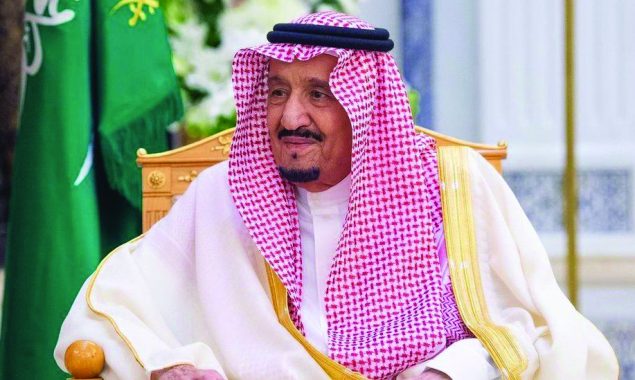
RIYADH: Saudi Arabia’s King Salman bin Abdulaziz urged Iran to end its “negative behavior” in the region, after Riyadh accused Tehran of aiding Yemeni rebels in launching deadly attacks on his country.
The monarch who turns 86 this week, addressing the Shura Council, the top government advisory body, virtually for a second year in a row, spoke for less than four minutes. He read slowly from a white piece of paper, pausing at times, in a speech broadcast three hours after its initial scheduled time.
The official Saudi Press Agency later released the King’s full statement.
“We hope (Iran) changes its policy and negative behaviour in the region, and it heads towards dialogue and cooperation,” he said, according to the statement.
“We are following with great concern the Iranian regime’s destabilising policy to security and safety in the region.”
Riyadh and Tehran have been bitter foes for decades, taking opposing sides in a range of regional conflicts, including in Yemen where Saudi Arabia leads a military coalition against Houthi rebels.
The two sides have held several rounds of talks since April aimed at improving relations.
King Salman, however, accused Iran of “establishing and supporting” sectarian and armed groups in the region.
“We are also following the Iranian regime’s support of the terrorist Houthi militia, which is prolonging the war in Yemen and exacerbating the humanitarian situation there, as well as threatening the security of the Kingdom.”
Yemen has been wracked by civil war since 2014 pitting the government, supported by the Saudi-led coalition, against the Houthi Shiites who control much of the country’s north, including the capital Sanaa.
Tens of thousands of people have been killed in what the United Nations describes as the world’s worst humanitarian crisis, with over 80 per cent of Yemen’s population dependent on aid.
The coalition accused Iran and Lebanon’s Hezbollah group of helping the Houthis launch missiles and drones at Saudi Arabia, where two people were killed last week.
Saudi Arabia has long accused Iran of supplying the Houthis with sophisticated weapons and its Hezbollah proxy of training the insurgents. Tehran denies the charges, while Hezbollah has dismissed them as ‘ridiculous’.
On oil, King Salman said Riyadh was “keen to keep the OPEC+ agreement working due to its essential role in stabilising oil markets”, stressing the importance of all participating countries’ commitment to the deal.
The Organisation of Petroleum Exporting Countries (OPEC) and allied producers agreed this month to stick to planned increases in output in January, despite the economic uncertainties linked to the Omicron coronavirus variant.
Iran calls for inclusive government
Day earlier, Tehran called for the formation of an inclusive government in war-ravaged Yemen, where Houthi rebels are battling the internationally-recognised government backed by a Saudi-led military coalition.
“We believe that it is necessary to form a government in which all Yemeni parties participate, to maintain the national unity and sovereignty of Yemen,” Iran’s Foreign Minister Hossein Amir-Abdollahian said.
The crisis in Yemen “has only a political solution”, he added, according to state news agency IRNA.
Amir-Abdollahian was speaking at a memorial event for Hassan Eyrlou, Iran’s late envoy to Yemen’s rebel-held capital Sanaa.
Eyrlou died on Tuesday from coronavirus, days after his evacuation aboard an Iraqi plane, a rare exemption from air blockade on Sanaa.
Iran’s foreign ministry blamed the “slow cooperation of certain countries” in facilitating Erylou’s evacuation, comments condemned by the Saudi-led coalition’s spokesman Turki al-Maliki as “defamatory”.
Sanaa airport ready to receive flights
Houthi rebels said they have allowed the temporary resumption of UN aid flights into the capital Sanaa, a week after a halt due to coalition air strikes.
“The civil aviation authority announces the resumption of UN and other organisation flights into Sanaa airport on a temporary basis,” the rebel-run Al-Masirah television reported.
“The (rebel administration’s) foreign ministry was contacted to notify the UN and all international organisations that Sanaa airport was ready to receive flights.”
Yemen has been wracked by civil war since 2014 pitting the government, supported by the Saudi-led coalition, against the Iran-backed Houthis who control much of the north.
The UN, which has described the situation as the world’s worst humanitarian crisis, estimates the conflict will have claimed 377,000 lives by the end of the year through both direct and indirect impacts.
More than 80 per cent of Yemen’s population of about 30 million is dependent on humanitarian aid.
Flights into the rebel-held capital have been largely halted since August 2016, but there have been exemptions for aid flights that are a key lifeline for the population.
The Houthi rebels had said UN aid flights into Sanaa had been halted by Saudi-led air strikes, but the coalition said the airport had already been closed two days earlier and blamed the insurgents.
Coalition spokesman Turki al-Maliki said the Houthis were “militarising” Sanaa airport and using it as a “main centre for launching ballistic missiles and drones” towards the Kingdom.
The coalition, last week, launched what it called a “large-scale” military operation against the Houthis after the fatal rebel attack. The coalition raids killed three civilians, including a child and a woman, Yemeni medics told AFP.
The coalition maintains its operations are carried out in accordance with international humanitarian law and has repeatedly accused the Houthis of using civilians as human shields.
UN special envoy Hans Grundberg said the uptick in fighting “undermines the prospects of reaching a sustainable political settlement to end the conflict in Yemen.”
“The escalation in recent weeks is among the worst we have seen in Yemen for years and the threat to civilian lives is increasing,” Grundberg said.
He renewed a longstanding UN call for Sanaa airport to reopen permanently for commercial as well as humanitarian flights.
“Any targeting of civilians and civilian objects as well as indiscriminate attacks by any actor is a flagrant violation of international humanitarian law and must stop immediately,” the UN envoy said.
UNSC intervention seek out
According to Saudi Gazette, Saudi Arabia demanded the intervention of the United Nations Security Council (UNSC) to stop the continuing war crimes of the Houthi militias against the Kingdom.
The UNSC should shoulder its responsibility to act against the war crimes of the Houthi militias, their weapons supplier and the elements that fund their terrorist acts so as to stop their threats to international peace and security, said Abdullah Al-Mouallimi, Saudi Arabia’s ambassador to the United Nations.
He said this in a letter sent to the UNSC in the wake of the continued terrorist attacks committed by the Iranian-backed terrorist Houthi militias against civilians in Saudi Arabia.
On December 24, a military projectile, launched by Houthis, fell on a commercial store in the Samtah governorate in the southern Jazan region. This hostile act had resulted in the death of a Saudi citizen and a Yemeni resident, in addition to the injury of seven civilians and the damages to two shops and 12 vehicles, Al-Mouallimi said.
“It is obvious that the absence of strict actions by the international community, and in particular the United Nations Security Council, towards the Houthis militias’ weapons supplier will allow these terrorist militias to continue their terrorist acts in the region,” he said.
Catch all the International News, Breaking News Event and Latest News Updates on The BOL News
Download The BOL News App to get the Daily News Update & Follow us on Google News.




